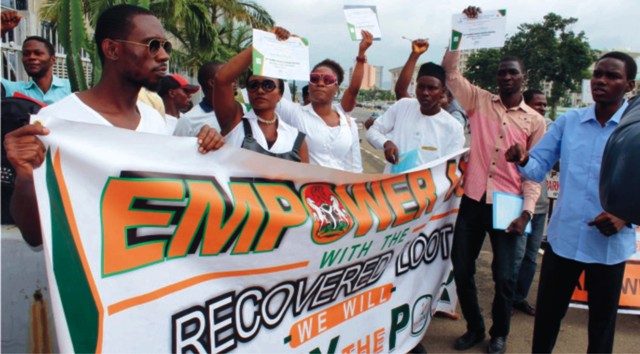Featured
Zamfara: 371 Killed, Several Villages Sacked Since Jan – Amnesty Int’l

Amnesty International has said 371 people have been killed in Zamfara State since January this year, while dozens of villages sack due to herders, farmers clashes and bandits attacks.
It said out of the 371 people killed, at least 238 of these killings took place after the deployment of the Nigerian air force, accusing the government of neglecting the most vulnerable communities in the region.
The human rights body described the security situation in the state as “escalating”, with daily killings and kidnappings by armed bandits leaving villagers in constant fear of attack.
Zamfara State has been facing a deadly conflict since 2012 as a result of clashes between farmers and herders. Gradually, the conflict turned into armed banditry, with the first major attack in ’Yar Galadima in April 2014 when 200 people were killed.
The armed bandits raid villages and kidnap for ransom. On 22 November 2017, the government ordered the deployment of a Special Forces battalion in Zamfara after gunmen attacked communities in Shinkafi and Maradun LGAs.
On 4 April 2018, the Nigerian Air Force deployed Special Forces in the state following attacks in Bawan Daji village in Anka LGA.
On 6 June 2018, following a National Security Council meeting held between security chiefs and the president, the Inspector General of Police announced that 2,000 special security personnel comprising the military, police and civil defence would be deployed to Zamfara.
In a statement by Media Manager, Amnesty International Nigeria, Isa Sanusi, quoted the Director of Amnesty International Nigeria, Osai Ojigho, as saying thousands of people have been displaced by a conflict which began in 2012 as a result of clashes between farmers and herders.
“This is Nigeria’s forgotten conflict. The authorities’ failure to act has left villagers in Zamfara at the mercy of armed bandits, who have killed hundreds of people over the course of two bloody years,” Ojigho said.
“When we visited the region, villagers told us that they had pleaded with the government to help them after receiving warning letters from the bandits ahead of attacks but had received no protection. The Nigerian authorities have repeatedly claimed to be tackling the situation, but the mounting death toll tells a different story,” Director of Amnesty International Nigeria said.
According to Amnesty International “On Friday 27 July, 18 villages in the Mashema, Kwashabawa and Birane districts of Zurmi local government area of Zamfara state were attacked, leaving at least 42 people dead. At least 18,000 residents of the affected villages who were displaced over the weekend are now taking refuge at various locations in the local government headquarters. The following day a further 15 people were kidnapped in Maradun local government area.
“On Saturday 28 July, President Muhammadu Buhari announced the deployment of 1,000 troops to Zamfara. This is the third time since November 2017 that the authorities have deployed the military in response to attacks, but villagers told Amnesty International that this has not translated into protection for remote, vulnerable communities.
“Previous military interventions have failed to end the killings, especially in rural areas of Zamfara. At least 371 people have been killed in Zamfara in 2018 alone, and at least 238 of these killings took place after the deployment of the Nigerian air force. The government is still neglecting the most vulnerable communities in this region,” said Osai Ojigho.
“Between Sunday 7 and Thursday 12 July, Amnesty International visited communities in five local government areas of Zamfara state – Zurmi, Maradun, Maru, Anka and Tsafe. Although security forces were present in the state capital Gusau, researchers saw soldiers and air force personnel in only two of the villages they visited, Birane and Bagega.
“Villagers described feeling helpless and on edge, constantly bracing themselves for attacks. Men said they are sleeping outside their homes and in trees as a way of keeping vigilant, while women and children are sleeping together in groups for protection.
“Villagers described a pattern where they receive warnings ahead of attacks, including by phone, ordering them to pay huge sums of money or be killed or abducted.
A villager from Gidan Goga said: “Before Ramadan, the bandits called with the same number they called me with two weeks ago and said if we didn’t pay them N500,000, they would come and kidnap me or the village head. Right now, we are living in fear,” Amnesty International said.
The human rights body further stated that in several communities, villagers said they were afraid to venture more than a few kilometres into the bush, which is preventing them from farming. “They would not take Amnesty International researchers to see attack sites for fear of meeting the bandits, highlighting the unrelenting threat of attack.”
It added that a village elder from Gidan Goga told Amnesty International: “We cannot go to farm far from our village. Two weeks ago, I got a call from one of the bandits, saying they are the ‘owners’ of the forest. He asked me to tell the village head to tell all villagers close to the forest to vacate the villages and come here, Gidan Goga. He said the only way they’d allow the villagers to continue staying was if they paid them five million Naira.”
In a village in Maru, villagers said the only time they see security forces is when they are escorting workers to the state governor’s farm.
“There’s no security here and we live in fear. We can’t go to farm because of fear, meaning it is difficult to feed our families. To go to farm, you need security. The governor’s farm is not too far from here and security forces go with his workers whenever they have to go there,” Amnesty International quoted another of the villager as saying.
The villager added that villagers would wait until the governors’ workers were being escorted and travel alongside, to take advantage of the security presence.
Amnesty International quoted an unnamed senior police officer in Zamfara as saying that the police lacks the logistics and manpower to deal with the crisis in the state.
“The crisis in Zamfara is making life hell for villagers, yet it is clearly low down on the list of government priorities. These killings must stop immediately, and those suspected of criminal responsibility must be brought to justice in fair trials. The Nigerian authorities have a responsibility to protect the lives of everybody in the country, including people in poor and rural communities,” said Osai Ojigho.
Featured
FG To Seize Retirees’ Property Over Unpaid Housing Loans

The Federal Government Staff Housing Loans Board says it has begun the compilation of list of retired civil servants who have defaulted on the full repayment of housing loans obtained.
Head of Information and Public Relations, FGSHLB, Mrs Ngozi Obiechina, disclosed this in a statement in Abuja, yesterday.
Obiechina quoted the Executive Secretary of the Board, Mrs Salamatu Ahmed, as saying that the move was aimed at recovering mortgaged properties from retirees who failed to meet their loan obligations.
Ahmed noted that the decision followed a recent memo issued by Mrs Patience Oyekunle, Permanent Secretary, Career Management Office, Office of the Head of the Civil Service of the Federation.
According to her, the memo reminded public servants of the mandatory requirement to obtain a Certificate of Non-Indebtedness to the FGSHLB and MDA Staff Multipurpose Cooperative Society as a precondition for retirement.
The Executive Secretary said that the board would take necessary legal steps to repossess properties where applicable, in line with the terms of the loan agreements.
She said this was in line with the provisions of the Public Service Rules 021002 (p), issued by the Office of the Head of the Civil Service of the Federation.
“I am directed to bring to your attention the provision of Public Service Rule (PSR) 021002 (p), which mandates all public servants to obtain a Certificate of Non-Indebtedness as a prerequisite for retirement.
“The Federal Government will commence the seizure of mortgaged properties belonging to retiring federal public servants who have failed to fully repay housing loans obtained from the board,” she said.
Ahmed explained that the FGSHLB reserves the legal right to repossess any mortgaged property in cases where a public servant exits service without fully repaying the loan.
She reiterated that the directive also applied to already retired officers who were still indebted.
She urged all affected public servants to regularise their loan status and obtain the required clearance certificate without delay.
“The board is currently compiling a list of such retirees, which will be forwarded to relevant regulatory agencies for debt recovery.
“The FGSHLB remains committed to enforcing compliance and ensuring proper loan recovery procedures are followed, “ she added.
Featured
FG Begins Induction For New Permanent Secretaries, Accountant-General

The Federal Government has kicked off a three-day induction programme for newly appointed Permanent Secretaries and the Accountant-General of the Federation, aimed at equipping them for strategic leadership and effective policy implementation.
The induction, according to a statement yesterday by the Director, Information and Public Relations, Federal Ministry of Information and National Orientation, Eno Olotu, which commenced on Wednesday, is being held at the National Counter Terrorism Centre in Abuja.
Speaking at the opening session, the Head of the Civil Service of the Federation, Mrs. Didi Esther Walson-Jack, congratulated the new appointees and described their roles as pivotal to governance and national development.
“Permanent Secretaries are the engine room of the government. They are critical to driving policy implementation, institutional performance, and reform across the service”, she said.
The Federal Government has kicked off a three-day induction programme for newly appointed Permanent Secretaries and the Accountant-General of the Federation, aimed at equipping them for strategic leadership and effective policy implementation.
The induction, according to a statement yesterday by the Director, Information and Public Relations, Federal Ministry of Information and National Orientation, Eno Olotu, which commenced on Wednesday, is being held at the National Counter Terrorism Centre in Abuja.
Speaking at the opening session, the Head of the Civil Service of the Federation, Mrs. Didi Esther Walson-Jack, congratulated the new appointees and described their roles as pivotal to governance and national development.
“Permanent Secretaries are the engine room of the government. They are critical to driving policy implementation, institutional performance, and reform across the service”, she said.
“The expectations are high, and the responsibility is immense. But with commitment and teamwork, we can deliver a more efficient, accountable, and citizen-centred public service.
“This final lap of FCSSIP 25 calls for urgency, accountability, and strategic focus. You must translate vision into measurable results,” she stated.
In her welcome address, the Permanent Secretary, Career Management Office, Mrs. Fatima Sugra Tabi’a Mahmood, described the programme as a strategic investment in leadership capacity and institutional effectiveness.
The sessions featured expert-led discussions, simulations, and strategic briefings facilitated by a distinguished faculty, including Engr. Suleiman Adamu, former Minister of Water Resources; Dr. Hadiza Bala Usman, Special Adviser to the President on Policy and Coordination; Mrs. Beatrice Jedy-Agba, Solicitor-General of the Federation and Permanent Secretary, Federal Ministry of Justice; Alh. Yusuf Addy, retired Federal Director; Alhaji Bukar Goni Aji, former Head of the Civil Service of the Federation; Amb. Mustapha Lawal Suleiman, Mr. Adesola Olusade, and Dr. Ifeoma Anagbogu, all retired Permanent Secretaries.
Participants include Dr. Obi Emeka Vitalis, Mrs. Fatima Sugra Tabi’a Mahmood, Mr. Danjuma Mohammed Sanusi, Mr. Olusanya Olubunmi, Dr. Keshinro Maryam Ismaila, Dr. Akujobi Chinyere Ijeoma, Dr. Umobong Emanso Okop, Dr. Isokpunwu Christopher Osaruwanmwen, Mrs. Oyekunle N. Patience, Dr. Kalba U. Danjuma, Mr. Nadungu Gagare, Mr. Onwusoro I. Maduka, Dr. Usman Salihu Aminu, Mr. Ogbodo Chinasa Nnam, Mr. Ndiomu Ebiogeh Philip, Dr. Anuma N. Ogbonnaya, Mr. Adeladan Rafiu Olaninre, and Mr. Mukhtar Yawale Muhammed, alongside the Accountant-General of the Federation, Mr. Shamseldeen Babatunde Ogunjimi.
The induction programme will feature sessions on public sector leadership, policy delivery, ethics in service, digital transformation, and performance management.
Featured
NNPCL To Undergo Forensic Audit Soon -FG

The Minister of Finance and Coordinating Minister of the Economy, Wale Edun, has announced that a forensic audit of the Nigerian National Petroleum Company Limited (NNPCL) will begin soon.
Edun revealed this at the ongoing Nigerian Investor Forum, held alongside the IMF/World Bank Spring Meetings in Washington DC.
The minister explained that the recent changes in the NNPCL management are part of a broader effort by the Federal Government to clean up and examine the company closely.
While addressing top global investors, including representatives from J.P. Morgan, Edun shared key reforms the government has introduced to revive the economy and restore investor confidence.
He told the investors that the government’s bold economic steps have laid a strong foundation to attract private investment.
He stated, “Our goal is not just to maintain this momentum, but to accelerate it. We are targeting seven per cent annual growth, and we believe the policies we have implemented have laid the groundwork to achieve this.”
Edun highlighted that President Bola Tinubu’s administration has rolled out major reforms that are already making a difference.
He added that the Nigerian economy grew by 3.84 per cent in the fourth quarter of 2024 and recorded a 3.4 per cent growth for the year.
Edun further stressed the importance of the reforms, describing them as “unprecedented,” adding that, “We said we would do it, and now we have done it. This time, we’re staying the course.”
He pointed out signs of progress such as lower budget deficits, a better trade balance, and a more stable exchange rate.
He also said that the focus is now on growing key sectors, especially agriculture.
According to Edun, agriculture is at the top of the government’s agenda, with the aim of improving food supply and increasing productivity.
“We aim to close the food supply gap, not by importing more, but by enabling domestic producers to scale and innovate,” he said.
On infrastructure, Edun revealed that the government has rolled out 90,000km of fibre optic cable to improve internet access.
He said this move is crucial for supporting young Nigerians and tech startups.
He also noted that 4,000km of roads have been offered for private sector participation, with the first 1,000km already approved for construction.
-
News1 day ago
Over Two Million Candidates Sit For 2025 UTME -JAMB
-
Nation24 hours ago
Ekiti Vaccinates Over 226,000 Girls Against HPV
-

 Maritime5 days ago
Maritime5 days agoRice Smuggling Still Increasing In Creeks – RMIDN
-
Niger Delta1 day ago
Save Journalist Battling Cancer, NUJ Urges Isoko Indigenes
-
Business1 day ago
Keyamo Refutes Claims On Enugu Airport Concession
-
News1 day ago
Nigeria Seeks Return To JP Morgan Bond Index
-

 Education5 days ago
Education5 days agoEaster: VC Preaches Love, Compassion, Kindness
-
News1 day ago
Okpebholo Denies Paying N6bn To Terrorist Group In Edo

